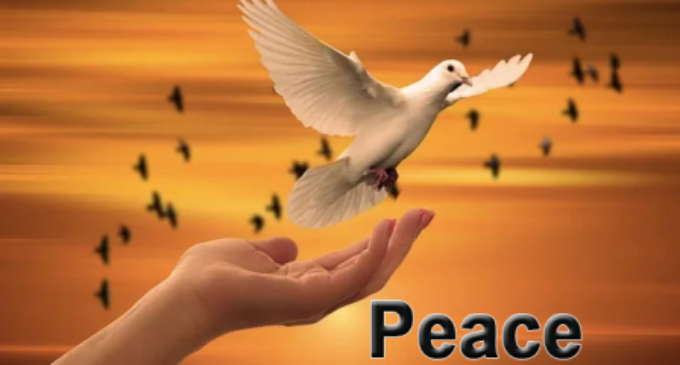Peace is key to growth and prosperity of society

Earlier people knew how to live in peace and harmony with nature and other animals, but with the realization of power and greed, it was we who harmed their harmonized relation with the environment.
By Er Taraprasad Mishra
Peace is the path we take for bringing growth and prosperity to society. If we do not have peace and harmony, achieving political strength, economic stability and cultural growth will be impossible.
Moreover, before we transmit the notion of peace to others, it is vital for us to possess peace within to bring growth and prosperity in a society, the path that wiser people take is of peace and harmony. Without peace and harmony in a nation, it is impossible to achieve political strength, economic stability, or cultural growth.
Before transmitting the notion of peace and harmony, among others, an individual needs to possess peace within them while their body and mind should be in balance. Even one person can transmit the notion of peace and harmony, among others, and it is everyone individual’s responsibility to maintain that peace and harmony in society.
However, peace and harmony in society are disrupted with the increase in violence and chaos. Science and technology were supposed to make our life comfortable. In contrast, people find alternative ways to use good inventions for an immoral purpose and eventually harm the ways of other’s living with peace and harmony. As the saying goes that with immense power so comes the tremendous responsibility is not at all a lie, for the government of each nation should invest on education, healthcare, and productive means to resolve economic issues rather than initiating war or destructiveness. If destructive ways among nation are promoted, then peach and harmony will not exist, and poverty will remain to be an everlasting problem. The root to most of our troubles is the disruption of peace and harmony between one aspect of our life to another.
Earlier people knew how to live in peace and harmony with nature and other animals, but with the realization of power and greed, it was us who harmed their harmonized relation with the environment. This change in the way of living is not at all desirable because the effects of ruining the harmony and peace in the ecosystem will have to be faced by us. Hence, people must always realize that a little kindness, compassion and self-perseverance can restore the sense of humanity in one and resolve all issues regarding peace and harmony in our life. Peace and harmony is the fundamental prerequisite of our life and an ideal path to follow.
Many ideas contribute to the logic of peace and harmony such as dealing with disputes, staying calm and focused, resolving conflicts, adjusting, adapting, neutralization, following the ‘middle way’ principle, etc. With globalization we are not anymore divided into our concentrated area of state or nation; instead, the world has united with the unprecedented extent of bond regardless of borders and resulting into the formation of a great and happy global community. And to maintain the well being of every individual of this global community, ultimately everyone has to implement the means of peace and harmony into the way of our living.
The issue of war and peace has always been a focal issue in all periods of history and at all levels relations among nations. The concern of the humankind for peace can be assessed by taking into account the fact that all religions, all religious scriptures and several religious ceremonies are committed to the cause of peace and all these advocate an elimination of war. The Shanti Path recited by the Hindus, the sermons of Pope and the commands of all the holy scriptures of the Christians, Muslims, Hindus, Sikhs and all other communities hold out a sacred commitment to peace. Yet the international community fully realized the supreme importance of the virtue of peace against the evil of war only after having suffered the most unfortunate and highly destructive two World Wars in the first half of the 20th century. The blood soaked shreds of humanity that lay scattered in several hundred battle grounds, particularly on the soils of Hiroshima and Nagasaki, cried for peace, peace and peace on the earth. The human consciousness then rallied in the Charter of the United Nations to affirm.
“We the people of the United Nations determined to save succeeding generations from the scourge of war, which twice in our life time has brought untold sorrow to humankind…. and to unite our strength to maintain international peace and security….. have resolved to combine our efforts to accomplish these aims.” Since 1945, the United Nations and its specialized agencies, several international associations and institutions, international peace movements, global and national level human rights movements and in fact all members of the international community have been consistently and strongly advocating the need for the preservation and promotion of peace against war. In contemporary times, the most urgent and important international objective has been to preserve protect and defend peace against terrorism and terrorist organizations like Al Qada, Talibans, and other enemies of peace.
Through international peace keeping under the aegis of the United Nations through the development and use of international law; creation of more international and regional institutions committed to promote peace, promotion of friendly cooperation for development among the member countries; popularization of peaceful means of conflict-resolution, institutionalization of relations among nations; integration of international community through strengthening of human consciousness in favour of peace against war; and by enhancing the ability for crisis-management, the humankind has been trying to secure peace against war. One elementary way of defining peace has been to say that peace is absence of war. This is, however, a very narrow view of peace.
No doubt absence of war is the first condition of peace, yet peace is not merely an absence of war. It is in reality a condition characterised by peaceful, cooperative and harmonious conduct of international relations with a view to secure all-round sustainable development of the people of the world. Nevertheless, since absence of war is the first condition of peace, one of the major concerns of all scholars and statesmen has been to formulate and follow the principles and devices needed for securing this primary objective. The cold war that kept the world preoccupied during 1945-90, indirectly secured this objective in a negative way by developing a balance of terror in international relations.
While it was successful in preventing a global war, it failed to prevent local wars and in fact gave rise to several tensions, stresses, strains and crises in international relations. The international community had to work very hard for keeping the conflicts and wars limited. It, however, successfully exhibited a welcome and positive ability in the sphere of crisis-management. In fact, till today there have been present several hindrances in way of securing a stable, healthy and enduring peace. Fortunately, the final end of cold war came in the last decade of the 20th century and the world found herself living is an environment characterised by a new faith and commitment to peace, peaceful co-existence, peaceful conflict-resolution, liberalisation, cooperation for development and attempts at sustainable development.
The people began focusing their attention on the need for the protection of human rights of all, protection of environment and securing of a real and meaningful international integration. However several negative factors, ethnic conflict, ethnic violence, ethnic wars, terrorism in its several dimensions, neo-colonialism, hegemony n-hegemony and the like kept on acting as big hindrances.
The need to secure peace by controlling these evils continues to be a primary aim of international community. Crises have been repeatedly coming and these are bound to keep coming. This makes it very urgent for the humankind to prepare and act for managing crises through collective efforts and by the use of several devices.






